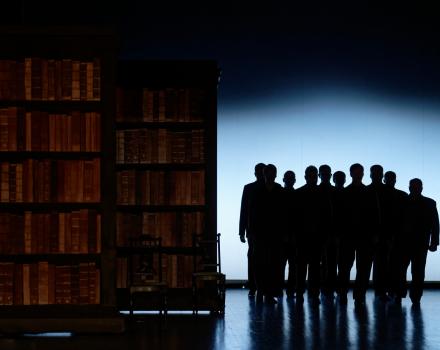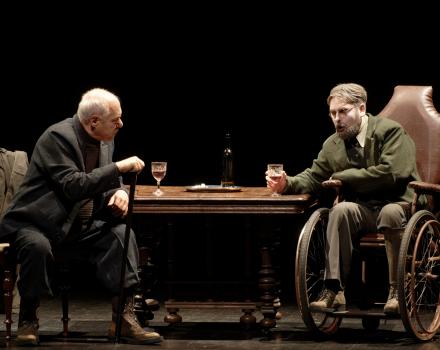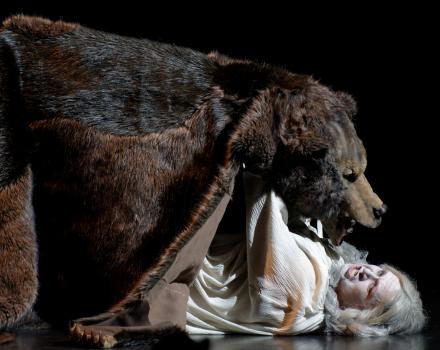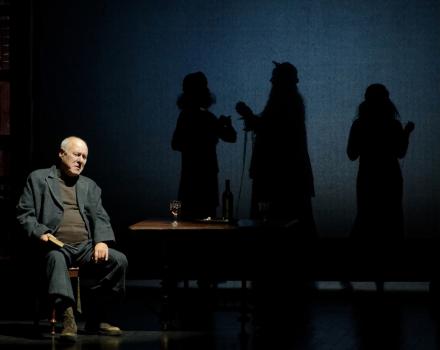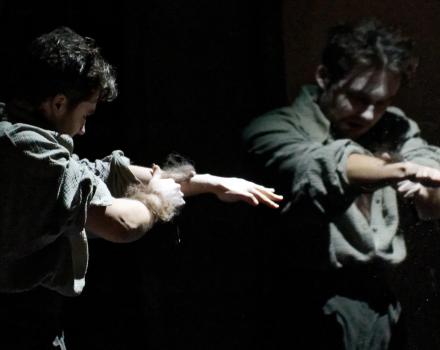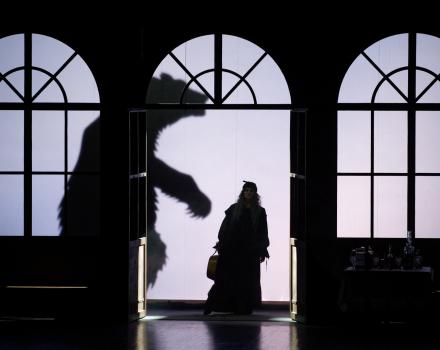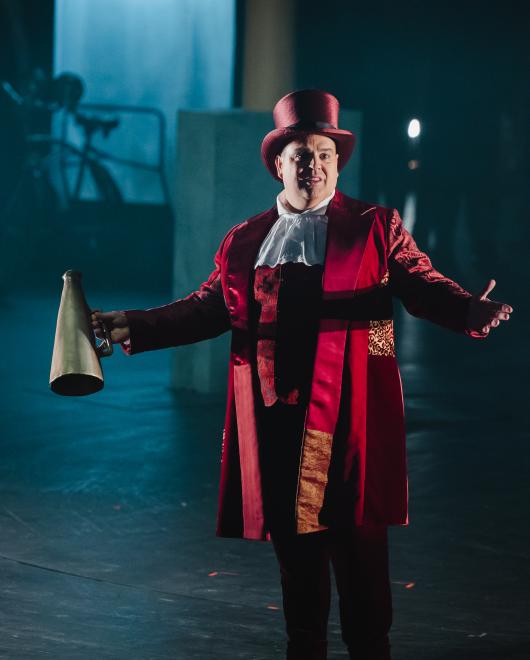The Bear

The story is set in a wild and remote corner of 19th-century Lithuania, where folk customs and pagan beliefs still have a hold sway on the population. Here we meet a strange family consisting of the young count, Michel (Mykolas), who exhibits animalistic behaviours, and his mad mother who, as legend has it, was raped by a bear at her own wedding. Reputed to be the product of this bestial assault, the half-human half-bear falls in love with the beautiful girl from the next manor, Miss Julia, and asks for her hand in marriage. Will this union be enough to tame the young count’s dual nature?
Written in 2000, The Bear (Lokys) is the third opera by Lithuanian composer Bronius Kutavičius (1932–2021) and his first ‘grand’ opera, if not in terms of duration - it’s under two hours - then in terms of artistic forces including many soloists, full orchestra, mixed choir and ballet scenes. A ‘mystic thriller’ based on a libretto by Lithuanian writer Aušra Marija Sluckaitė-Jurašienė, in which she retells the story of a bloody wedding inspired by the gothic fantasy novella Lokis (1869) by Prosper Mérimée. Like a horror movies of the silent era, the plot centres on the dark side of human nature and to what extent one can defy bestiality in favour of our humanity. Conducted by Music Director Martynas Staškus and the Lithuanian theatre director Gintaras Varnas, this awarding-winning production from Klaipėda State Music Theatre gives form to the conflict at the heart of the opera, juxtaposing the manor house and murky woods, civilisation and primordial chaos, culture and nature, light and darkness.
Cast
Count Šemeta | Andrius Apšega |
|---|---|
Julia, Count’s fiancée | Gunta Gelgotė |
Professor | Vladimiras Prudnikovas |
Countess, Count’s mother | Jovita Vaškevičiūtė |
One-eyed old woman | Aurelija Dovydaitienė |
Doctor | Tadas Jakas |
Wedding marshal | Mindaugas Rojus |
Count’s doppelganger | Šarūnas Šapalas |
Pranciškus, Count’s mute butler | Virginijus Pupšys |
Puppeteers | Lotta Aakko Ramunė Degutytė Milda Valaitytė Germanas Urbonavičius |
Orchestra | Klaipėda State Music Theatre Symphony Orchestra |
Chorus | Klaipėda State Music Theatre Chorus |
Chorus soloist | Emilia Janina Kozłowska |
| ... | |
Music | Bronius Kutavičius |
|---|---|
Text | Aušra Marija Sluckaitė-Jurašienė |
Conductor | Martynas Staškus |
Director | Gintaras Varnas |
Sets | Gintaras Makarevičius |
Costumes | Dainius Bendikas |
Lighting | Vilius Vilutis |
Chorus Master | Vladimiras Konstantinovas |
Choreographer | Mantas Stabačinskas |
| ... | |
Video
Story
Prologue
The action takes place at Count Šemeta’s estate in Medintiltis and its surroundings, in Samogitia, Lithuania, in the 19th century. The men’s chorus sings a pagan incantation: ‘I’m going to expel that evil spirit. Get thee out, evil spirit, through the bones, through the brain, through all the veins from that man, Count Šemeta…’ A carriage is heard approaching.
Act I
Count Šemeta’s estate. Library room. Professor Wittembach, an accomplished linguist and a Protestant minister, a friend of the old count, arrives at the manor of Medintiltis in Samogitia, in rural Lithuania. Pranciškus, a mute butler, is waiting for him. The Professor asks when he will be able to see the young master of the manor and is surprised that the servant bows and leaves instead of answering. On the library shelf, the Professor sees a book he has been looking for a long time: Catechismus Samogiticus.
The Doctor, a former military surgeon and veteran, arrives at the library in a wheelchair to greet the guest. He invites the Professor to join him for dinner, as the Count has a migraine. The Doctor tells him about the Count’s strange habits, his passion for hunting at night. He also warns that the Count’s mother, the old Countess he is treating, has been suffering from a mysterious illness for many years: she was taken and mauled by a bear during a hunting trip shortly after her wedding, and has been suffering from a clouded mind since then. The Countess was rescued by her servant Francis, who was then scared out of his wits and lost his speech.
Before the Doctor can finish his story, the old Countess bursts into the room with a knife in her hand. The servant Pranciškus tries to stop her. Tormented by her past experiences, the Countess uses the knife to stab the bear skin and curses what she imagines to be her unborn child. The Doctor takes out a pair of large scissors and threatens to cut off the Countess’s hair. The Doctor and Pranciškus take the Countess away.
During the night, a one-eyed Old Woman is singing a folk song. To calm down, the Professor opens the Catechismus Samogiticus, but falls asleep, lulled by the Old Woman’s song.
The hoofbeats and the neighing of a horse is heard. The professor stirs from his sleep. Outside the window he sees a man dressed in black and wearing black gloves, who laughs and disappears. The Professor, frightened, calls Pranciškus for help.
The Count’s room, the next morning. The Count is talking to his Doppelganger – his reflection in the mirror – about the duality of nature, the attraction of the forest, the lust for blood and the longing for love.
The Professor enters. The Countgreets the distinguished guest, a friend of his father’s. He reminds him that his wedding to the noblewoman Julia is in three days. The Count extends his gloved hand to the Professor. The Professor looks at the black glove, at the Count’s eyes, as if remembering something, and shakes his hand in confusion. After excusing himself by saying that he is wearing gloves because of his allergy to dogs and horses, the Count asks how the Professor rested last night. When he hears that he has been haunted, he laughs with the same laughter as the night guest... The Count suggests that they go for a walk in the woods together and visit Miss Julia.
The Count and the Professor are walking in the forest. The Professor asks about Julia. The Count says that he is particularly fascinated by her white, transparent skin: when she drinks wine, you can see the blood pulsing in her veins, warm and sweet...
In the depths of the forest, the one-eyed Old Woman sits by a smouldering fire, singing the same song that the Professor has heard in his vision. When the Count and the Professor approach the Old Woman, she asks them to put a small coin into her lap. The choir again sings a pagan incantation against the evil spirit. The Old Woman asks for a second piece of silver, in return for which she promises to tell the Count’s future from the ashes. She says that the Count is at the crossroads: if he turns to the right, where Julia lives, he will be in trouble. He must go to the left, to the beasts, and become their king. The Count is annoyed by the Old Woman’s prophecies. He quickly leads the Professor through the forest and turns right.
A lake at the edge of a forest. Miss Julia’s abode. Julia swings in a swing and sings about a mermaid, who is accompanied by nothing but mute pain in the human world.
The Count, his Doppelganger and the Professor approach Julia. She hands them glasses of red wine and dances barefoot for them. Suddenly a seagull screams, the glass falls from her hands and breaks. Julia steps on the shards of glass and pierces her foot. Seeing the blood, the Count greedily sucks his lips into the wound. Horrified, Julia pushes the Count away from her.
The awkward scene is interrupted by Pranciškus running in. He signals the Count to hurry home – the Countess is having a fit. The Count bids farewell to his fiancée until the wedding on Sunday and leaves. Julia has a bad premonition.
Act II
Wedding day. Ballroom. Guests await the arrival of the bride and groom – Count Šemeta and his fiancée Julia. The rumble of an approaching carriage is heard. The guests greet the newlyweds. The old Countess sees that the Count is holding Julia in his arms and starts screaming ‘It’s a bear!’”. She tries to shoot him. Pranciškus runs in. The Doctor grabs the Countess and cuts her grey hair. The guests whisper about the signs of ill fate, the lunar eclipse at midnight on the full moon.
The Count apologises to the guests and invites the wedding marshal to begin the oration. The Professor joins the hands of the bride and groom and says the oath, which is repeated by the Count and Julia. The Count toasts to the happiness of both. Julia reciprocates and hopes that a special destiny awaits them. The Doctor suggests drinking from the young lady’s shoe, as is the custom of the cadets. The Count removes Julia’s shoe and stares at the bloodstain left by her pierced foot. His lust for blood is hard to suppress. Julia is increasingly overwhelmed by anxiety, which she tries to suppress and rely on the healing power of love.
The wedding revelry is becoming rampant. At the height of the frenzy, a one-eyed Old Woman appears in the hall. She offers to be a matchmaker. The Old Woman says she has come uninvited to wish the newlyweds not to be separated, not only in this world, but also in the other world. She tells the Count that the spell has been cast: the Count himself has chosen to go straight to the Lord of the Underworld and she will accompany him there herself.
The Old Woman disappears and the guests start dancing again, as if nothing had happened. Suddenly, a shot rings out. The Doctor rushes out in his wheelchair to the garden to see what has happened and returns holding Julia’s dead body with a bloody neck in his arms. The old Countess appears in her wedding dress, holding a pistol. The Count, in a single shirt, enters, limping with a shot leg. The Countess, shouting ‘A bear!’ again, raises her pistol and fires. The Count falls dead.
Epilogue
The Professor leaves the manor of Medintiltis. Behind the stage, there is a chorus begging for forgiveness and a voice singing a farewell: ‘I’m leaving and take nothing along, but the heart takes it all on the road.’ At the same time, the last sentences from Prosper Mérimée’s novella Lokis sound as if they were echoing in the Professor’s mind.
Insights
The bestiality of human nature
An interview with Director Gintaras Varnas
‘Opera offers possibilities that drama simply doesn’t have. I, however, demand of myself that opera has real dramatic force.’ So says Gintaras Varnas, who has directed about fifty drama plays and operas at major theatres in Lithuania, Latvia and Slovakia, which have garnered him more than ten highest national theatre awards and the Lithuanian National Prize for Culture and Arts.
In October 2022, he presented a carefully staged production of The Bear by the recently deceased Lithuanian composer, Bronius Kutavičius (1932-2021), at Klaipėda State Music Theatre. This was the second production of this opera in Lithuania and the director’s first opera production in Klaipėda, dedicated to the 90th anniversary of the composer’s birth.
What is special about your interpretation of Kutavičius’s opera?
In my view, previous productions of The Bear have shown stronger emphasis on Lithuanian customs and ethnographic setting. For instance, the part of the One-eyed Old Woman is sometimes played by a folk singer. Even though the music of the opera echoes with authentic Lithuanian folk tunes and the sutartinės (ancient polyphonic chants), it seems to me that the ethnic motifs of a staging (such as costumes, games, and spells) or the image of Lithuania as a backward, barbaric ‘land of murderers,’ which has been prevalent in Western European literature at the turn of the nineteenth and twentieth centuries, are now becoming less interesting or relevant.
For me it is important to understand where the terrible legends about Lithuania come from; from Prosper Mérimée and other authors to Albert Camus. What is Lithuania in their eyes? A small country on the verge of Western civilization, some place between Europe and Russia, and what’s more, part of the vast Russian Empire at that time. From there, for centuries, Russian bears from the impenetrable forests kept creeping back to Europe. Much to my regret, these days the implicit protagonist of this opera – a bear raping Lithuanian countesses or Ukrainian girls – can be understood in this way too...
Be that as it may, it is much more interesting today to look at this opera as a dark tale – essentially, a gothic fiction. The first production of the opera was set in the second half of the nineteenth century, as it was written by Mérimée, while the story in the Klaipėda production is set in the 1920s. It was at the beginning of the twentieth century that a new art form–cinema–emerged, along with many new artistic trends and currents sprawling in hitherto unexplored directions, which came to be known under the moniker of modernism. This period of turbulent change and broad transformations is of great and inexhaustible interest to me.
The silent films of the 1920s display a variety of topics. I’m not talking about American comedy, but rather about German Expressionism in cinema. The story told in the opera can be easily classified into a vampire theme characteristic of horror movies of the silent era. It centres on the dark side of human nature, the duality of human-beast, and on the issue of how much bestiality there is in the human soul, to what extent one can defy bestiality and retain humanity.
Collision between human bestiality / feral nature (symbolized by a bear in the opera’s title and an epigraph ‘Grizzly and bear make quite a pair’) and human society / civilization is the key theme in this opera, which underpins both conceptual and visual design of this production.
Tell us more about the members of the creative team for the production in Klaipėda.
First of all, we had Maestro Martynas Staškus, a great music director, with whom we had already staged Verdi's Rigoletto at Lithuanian National Opera and Ballet Theatre more than twenty years ago. He also conducted the first production of The Bear at the same theatre, and had been in contact with the composer when he was alive, so he knew the music down to the smallest detail and was able to handle the seemingly simple-sounding, but in fact very polyphonic picture of a horrible story painted so evocatively with just a few strokes. Gintaras Makarevičius and I are old friends, having worked together on more than ten productions. But in fact, this was our first joint work on the opera stage. The aesthetics of silent horror films, which I proposed for my production, were perfectly conveyed by the elegant scenery and the elements of shadow theatre, created by Gintaras together with lighting designer Vilius Vilutis. It was complemented by the costumes of Dainius Bendikas, a young fashion designer who is now making his works in the theatre, mixing consciously antiquated and modern elements. I must also praise the theatre chorus, which was well prepared by the choirmaster Vladimir Konstantinov, and which was carefully taught the steps of the polonaise by choreographer and movement director Mantas Stabačinskas, with whom I was working for the first time as well.
What do you think today's audiences are looking for in opera productions?
The mission of art is to enlighten us and make us better human beings–that is, to break away from the beast within us and to fight against it. That is what the opera The Bear is about!
Gallery
